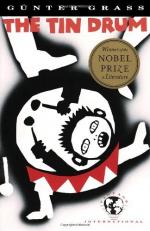|
This section contains 350 words (approx. 2 pages at 300 words per page) |

|
Günter Grass's primary function, from The Tin Drum on, has been to be good for the German people. The Nazis had both etiolated and inflated the German language. Grass restored blood and particularity to it and hurled whole dictionaries at his readers. He did not and still does not write what Thomas Mann would call novels, since naturalistic fictional technique would have imposed on him the duty of depicting with gloomy accuracy the shameful ante and post and bellum times, the alternative being to produce escapist fiction. He has looked at a diseased and convalescent and over-affluent Germany with the eyes of fantasy, that kind termed Rabelaisian, which admits monstrous exaggeration, word-play, mad catalogues, intestinal jokes and noises, allegory, magic, the setting of the historically embarrassing in a context of laughter. Grass and Rabelais meet in a generalized devotion to eating. The Flounder is not a wine...
|
This section contains 350 words (approx. 2 pages at 300 words per page) |

|


